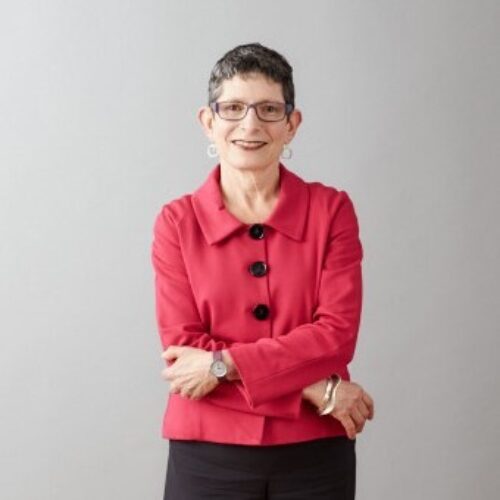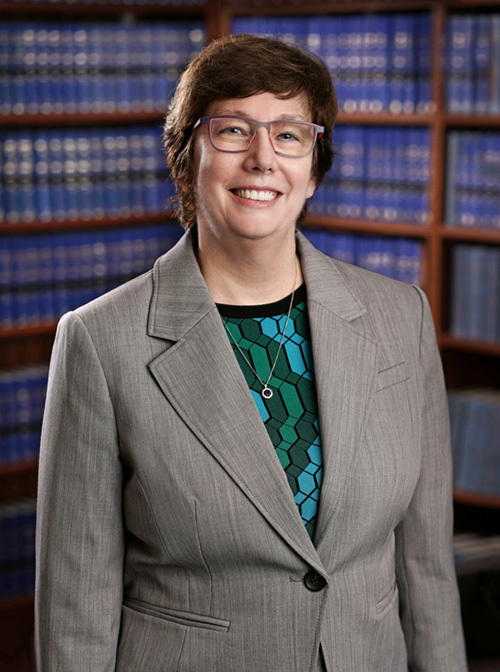- Winter 2023
- Interview with the Honourable Justice Jayne Jagot

Justice Jayne Jagot was sworn in as a judge of the High Court of Australia on 17 October 2022, at a ceremony reported on page 90 in this issue of Bar News.1
Bar News (BN) sat down with her Honour over a cup of tea, not long after her Honour had completed her first six months on the bench of the High Court, where, as was widely commented on at her swearing-in, her appointment led to that court being constituted by a majority of women for the first time in its history.
BN: Congratulations on your appointment which is now your third, and of course most distinguished, judicial appointment. Given that you spent a relatively short, albeit highly successful, time in legal practice, becoming a partner at a large law firm in record time, and then taking judicial office after only four years at the Bar, would you consider yourself a ‘career judge’?
The Honourable Justice Jagot (JJ): I think that if I had been born in a non-common law jurisdiction, I might well have chosen judging as a career, as that is something that is available as a career option on completing law studies in those countries. But that is something I can say only with hindsight: in our common law system, there is no analogous path and it is simply something that wouldn’t have occurred to me when I finished law school. Had that option been available, I may well have chosen it at that time, but I never considered being a judge when finishing law school. That did not seem possible then.
BN: You have served on three different courts: you were appointed to the specialist NSW Land and Environment Court (LEC) in 2006, and then the Federal Court of Australia (Federal Court) in 2008, and have now been appointed to the court at the apex of Australia’s judicial system, the High Court. How have you found the transition?
JJ: The transition from the Federal Court to the High Court has been relatively smooth. In my view, the most significant change is not so much from being a judge of one court to becoming a judge of another court. It is the transition from practising as a lawyer to sitting as a judge that is the biggest change. That is because judging is a very different function from practising law. You can have experience in writing opinions and preparing written submissions and while that is certainly good training, it is nonetheless a very different function from making a decision that resolves a dispute and preparing written reasons explaining that decision.
BN: The President of the NSW Bar Association, Gabrielle Bashir SC said in her speech at your swearing-in that ‘Your Honour … brings a unique understanding of the criminal law, ranging from environmental prosecutions to the Criminal Code (Cth) and the oft-closely entwined international humanitarian law’. The High Court hears quite a number of criminal law matters. Aside from those mentioned by Ms Bashir, is that likely to be one of the biggest subject matter changes in your work?
JJ: it’s certainly the case that I sat on environmental prosecutions in the LEC but I wouldn’t say I have a background in criminal law and in particular not in common law crime. I have sat on a number of criminal appeals since joining the court and like everything new, it involves more reading and more learning. I have always liked new legal areas: I have always enjoyed reading very broadly. Sitting on the High Court exposes a judge to a great variety of work. The matters can come from anywhere, both in the sense of which jurisdiction and which subject matter. Of course by the time they come to this court, the issues are much more honed than they would be in a trial.

BN: According to word on the street, a paper you gave to newly appointed judges at their recent National Judicial Conference of Australia conference has ‘gone viral’. Can you tell us something about the content of that speech?
JJ: Consistently with what I said about the transition from practice to judging, one of the things that judges uniquely have to deal with is the fact that at some stage we will be wrong, or at least be found to have been wrong by an appellate court. [BN obtained a copy of the paper and includes an extract here]
Judges are decision-makers, no more and no less. They make decisions of a particular kind, judicial decisions, which have a particular character – determining people’s legal rights, duties and liabilities according to law – and which must be the product of a certain decision-making process – one which is fair and open – but one way or another judges decide. If you don’t want to make decisions, particularly tough decisions, you may want to re-think what you are doing. Equally importantly, if you don’t want to explain your decisions in reasoned judgments, your judicial career will involve heartache.
If your basic job is to make decisions – day in and day out – no matter how hard you try, you are going to get some of those decisions wrong. It is best just to accept that immediately. At some time, every one of us has or will get it wrong. And I don’t mean that we will reach a decision about which reasonable minds might differ. I mean plain wrong. A judge who has never been wrong is just a judge who hasn’t made enough decisions or enough tough decisions. And we should also accept this–-we can be wrong whether or not we are overturned on appeal. In addition to being wrong, we can be told we are wrong or wrong enough by an appellate court. Being wrong is just what happens in any human system. And in our system, of judicial hierarchy, it’s the final appellate decision which counts. But all decisions, first instance or final, are human decisions, subject to the reality of human error.
BN: In the speech you talked about your own experience in that regard and in your swearing-in speech you noted that ‘I have sometimes been wrong. At the least, I have certainly been told I am wrong’. And one of the many media commentaries on your Honour’s appointment referred to the fact that after your appointment, one of your Honour’s decisions as a member of a Full Court of the Federal Court was set aside on appeal 5:0 by the High Court. The article also referred to other High Court judges who had had the same experience noting that this is not an uncommon experience.2 While on the subject of media commentaries, one of the most unusual items found by BN when preparing for this interview is a piece published in the Clarence Valley Independent in 2015.3 In a full page article, that newspaper effectively reproduced your Honour’s reasons in the consent determination of a native title claim over land in that area, some parts of which were as follows.4
Today, at last, the Yaegl People will be recognised as having that which they always in truth had – but which remained unrecognised by the common law of Australia – native title rights and interests in the land within the claim area.
The Yaegl People first sought recognition of their native title in November 1996, nearly two decades ago. …
That we have finally reached this milestone, belated as it is, is a testament to the unity, determination and strength of the Yaegl People. They, as a people, have endured the dispossession from their lands as a result of European settlement which the Native Title Act 1993 (Cth) (the NTA) is intended to recognise and redress, and have endured also the best part of two decades of legal process, to obtain legal recognition of who they are – the Yaegl People – and of the land which was theirs and over which they continue to enjoy the native title rights and interests identified in the proposed determinations.
The kind of delays which have been experienced in native title matters entrench injustice over generations. How sad, indeed how shameful it is, that in many of these matters the people who started the claim often become too aged or infirm to see the matter through or pass away, never having seen their labours bear fruit. …
In her speech Bar Association President Gabrielle Bashir referred to your Honour having been on Country for the consent determination in 2017 of the Western Bundjalung claim.5 Can you tell us a little about your role in the Federal Court’s native title jurisdiction? Did you have any background in Indigenous legal issues prior to joining the Federal Court?
JJ: [pointing to photos in her Honour’s chambers from on-Country determinations of Native Title] Being on Country was always an amazing experience. In terms of background, having been on the LEC, I had dealt with statutory claims under the Aboriginal Land Rights Act 1983 (NSW) but that is conceptually a very different legal framework and one that has nothing to do with native title or traditional laws and customs. So the native title jurisdiction was new to me and involved a steep learning curve. It’s a very complicated area of law as well as being emotionally tough. I managed that part of the Federal’s Court list for a number of years and in fact was in court conducting a case management conference in October 2022 when one of the barristers commented that he had just seen news of my appointment. We finished the hearing, and that was my final hearing in that court.
BN: On a completely different topic, something you have emphasised in each of your swearing-in speeches is the benefit you received from the public education system in Australia, coming as you and your family did from the UK. Do you still consider it possible for a person without a privileged background to achieve in the legal profession as you have done via the public education system?
JJ: I do believe that by comparison with the UK, Australia offers more opportunity. As a child of working-class parents, I don’t believe I would be in the position I am now in if my family had remained in the UK. Aspects of that society seem much harder and there is more emphasis on class. I haven’t done the research and don’t know the levels of social mobility statistically in the UK or Australia but I don’t believe that the same opportunities would have opened up for me in the UK. I consider that Australia is much more egalitarian than the UK but that is impressionistic: I have not done the research.
BN: Congratulations again and thanks for taking the time to talk to Bar News. BN
ENDNOTES
1 The full text of the remarks made by the attorney-general, the Hon Mark Dreyfus KC, leaders of the national and NSW legal profession, and of her Honour are reported at [2022] HCA Trans 176.
2 Michael Pelly, ‘Why the newest High Court judge got it wrong’, Australian Financial Review, 23 March.
3 Geoff Helisma, ‘What Justice Jagot said about the Yaegl Native Title claim’, Clarence Valley Independent, 1 July 2015.
4 Yaegl People #1 v Attorney General of New South Wales [2015] FCA 647.
5 Western Bundjalung People v Attorney General of New South Wales [2017] FCA 992
